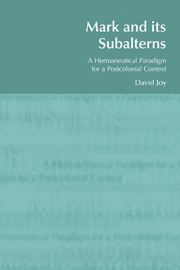Book contents
- Frontmatter
- Contents
- Foreword
- Acknowledgements
- 1 General Introduction
- PART I Hermeneutics: General Methodological Considerations
- 2 Hermeneutics: Indian Methods – Postcolonial Biblical Hermeneutics
- 3 Towards a Postcolonial Biblical Hermeneutics
- PART II Mark – Context and Interpretation
- Endnotes
- References
2 - Hermeneutics: Indian Methods – Postcolonial Biblical Hermeneutics
from PART I - Hermeneutics: General Methodological Considerations
- Frontmatter
- Contents
- Foreword
- Acknowledgements
- 1 General Introduction
- PART I Hermeneutics: General Methodological Considerations
- 2 Hermeneutics: Indian Methods – Postcolonial Biblical Hermeneutics
- 3 Towards a Postcolonial Biblical Hermeneutics
- PART II Mark – Context and Interpretation
- Endnotes
- References
Summary
Introduction
The search for a hermeneutical paradigm for India in a postcolonial context will have to be understood in the light of the sociocultural, religiopolitical situations of India during the colonial and postcolonial periods. In addition, a study of the hermeneutical patterns of the Bible during both colonial and postcolonial periods may also be desirable. As the Gospel of Mark is situated in the context of the Roman Empire, and the identity of the subalterns and marginalized in the Gospel of Mark is connected with the framework of the Roman colonialism, the study will expose such concerns. Moreover, a search for Indian hermeneutics will necessarily seek the presence of empire in a postcolonial context in many ways. Since the study aims to offer the subalterns in Mark as a hermeneutical model for understanding the engagement of the contextual groups in the process of liberation, an evaluation of Mark and its hermeneuts is necessary. Finally, this chapter will deal with the discourse of postcolonialism with specific reference to its application in the field of biblical hermeneutics.
Missionaries, Religion and Colonialism
In this regard, it is worth noting that there was a nexus between the missionaries and the colonizers during the colonial period. Many explorations of the link between the colonial missions and the local movements underlined the fact that both cultural and political dimensions were focused. However, local realities of indigenous institutions like Vamsha (lineage) and Jati (caste) were not redefined.
- Type
- Chapter
- Information
- Mark and its SubalternsA Hermeneutical Paradigm for a Postcolonial Context, pp. 11 - 32Publisher: Acumen PublishingPrint publication year: 2008

